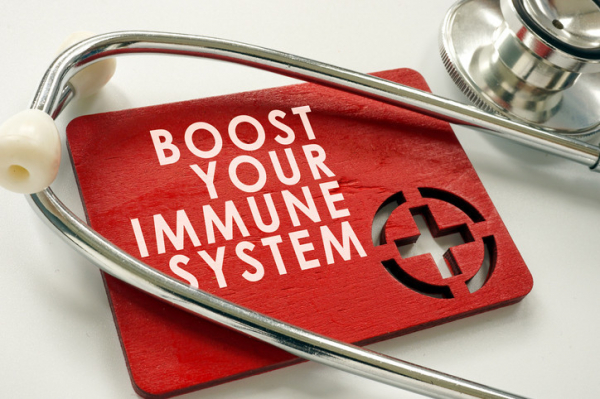
It’s winter, as a glance outside your window may tell you. COVID-19 is circulating at record levels across much of the country. Keeping our immune systems healthy has taken on new importance, as many of us hope to ward off flu and winter colds as well as worrisome variants of the virus that causes COVID-19, whether Delta or Omicron.
Not surprisingly, marketers are taking advantage of our concerns. A whole cottage industry is devoted to chewables, pills, and powders that claim to “boost” or “support” your immune system. Some people even claim that healthy eating and vigorous workouts are all you truly need to avoid getting sick. But are any of these claims true?
The best strategies for staying healthy
I asked Michael Starnbach, professor of microbiology at Harvard Medical School, for his advice on steps that can help us stay in good health this winter.
“Vaccination, skepticism of any other products claiming immune benefits, and staying away from places without universal masking are the best strategies,” he says. Here’s why these approaches count.
Get vaccinated
When it comes to improving your immune response, getting the COVID vaccine and booster shot, along with other recommended vaccinations, is best. Think of vaccination as a cheat sheet for your immune system. When a viral invader makes its way into your body, your immune system prepares to fight. But first it has to figure out what’s attacking, which takes time — time that allows the virus to keep multiplying inside your body.
A vaccine introduces the immune system to the invader ahead of time and allows it to develop a battle plan. So when the virus does show up at the door, your immune system can react quickly, which may mean no symptoms, or at least preventing serious illness. A booster shot is a refresher course to keep those lessons fresh.
While it is possible to become infected even if you are vaccinated, your immune system is primed to clear the virus more rapidly, so the infection is far less likely be severe or life-threatening. “We should get all available vaccines and boosters so that if we do get infected, we have a better chance of having a mild case,” says Starnbach.
Be skeptical
Any number of vitamin formulations and probiotics claim to boost or support your immune system. And while there is a grain of truth to some of those claims, the big picture is that they often don’t work. For example, vitamins do help immune function, but really only in people who have a vitamin deficiency — not in an average, healthy adult.
Probiotics also hold promise. This mini-universe of organisms living in your gut called the microbiome does play an important role in immunity. But experts don’t know enough about that role to create a product that can manipulate the microbiome to enhance immunity. That may change over the next decade — but for now, view probiotic claims with a healthy dose of skepticism, says Starnbach.
Mask up
Ultimately, nothing is better at keeping you well than avoiding exposure to a virus altogether. Wearing a mask isn’t on anyone’s favorites list, but it can help reduce the risk of spreading COVID (and some other viruses) to people who are unvaccinated, including children who aren’t yet eligible for the shot, and people with immune system deficiencies who don’t get adequate protection from the vaccine, says Starnbach. Masks are most effective when everyone around you is wearing one. “We now know clearly that the best way to prevent the unvaccinated from becoming infected is by indoor mask mandates,” says Starnbach.
Practice good health habits
But what about exercise and good nutrition? Do they have a role in supporting your immune system?
The answer is yes. Strategies to improve your overall health are never wasted. Healthy people are more resistant to disease, and often fare better if they are infected. Good health habits can help your immune system operate at its peak. Exercise and good nutrition aren’t the only habits that can help. You should also try to get consistent, high-quality sleep and manage your stress level. Lack of sleep and chronic stress can impair immune function.
But if you hope to avoid COVID-19 and other viruses, these strategies should come in addition to — not as a substitute for — vaccination and other protective measures.
